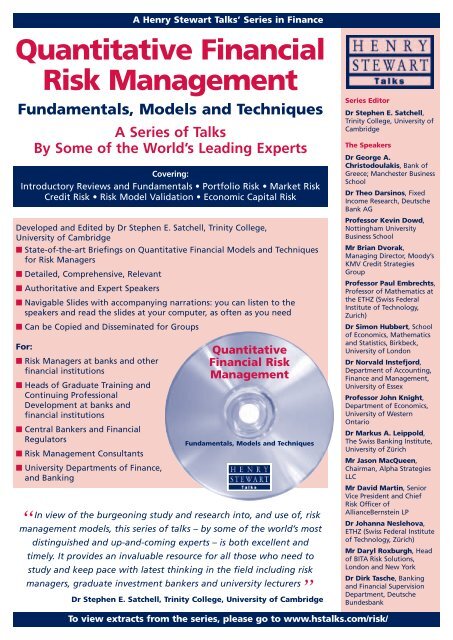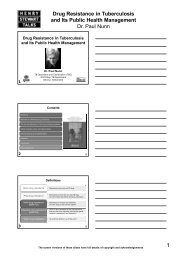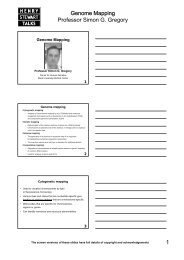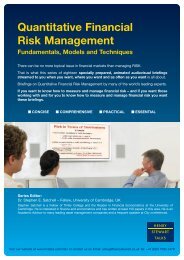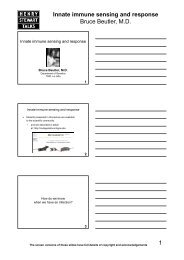Quantitative Financial Risk Management - Henry Stewart Talks
Quantitative Financial Risk Management - Henry Stewart Talks
Quantitative Financial Risk Management - Henry Stewart Talks
Create successful ePaper yourself
Turn your PDF publications into a flip-book with our unique Google optimized e-Paper software.
A <strong>Henry</strong> <strong>Stewart</strong> <strong>Talks</strong>’ Series in Finance<br />
<strong>Quantitative</strong> <strong>Financial</strong><br />
<strong>Risk</strong> <strong>Management</strong><br />
Fundamentals, Models and Techniques<br />
A Series of <strong>Talks</strong><br />
By Some of the World’s Leading Experts<br />
Covering:<br />
Introductory Reviews and Fundamentals • Portfolio <strong>Risk</strong> • Market <strong>Risk</strong><br />
Credit <strong>Risk</strong> • <strong>Risk</strong> Model Validation • Economic Capital <strong>Risk</strong><br />
Developed and Edited by Dr Stephen E. Satchell, Trinity College,<br />
University of Cambridge<br />
■ State-of-the-art Briefings on <strong>Quantitative</strong> <strong>Financial</strong> Models and Techniques<br />
for <strong>Risk</strong> Managers<br />
■ Detailed, Comprehensive, Relevant<br />
■ Authoritative and Expert Speakers<br />
■ Navigable Slides with accompanying narrations: you can listen to the<br />
speakers and read the slides at your computer, as often as you need<br />
■ Can be Copied and Disseminated for Groups<br />
For:<br />
■ <strong>Risk</strong> Managers at banks and other<br />
financial institutions<br />
■ Heads of Graduate Training and<br />
Continuing Professional<br />
Development at banks and<br />
financial institutions<br />
■ Central Bankers and <strong>Financial</strong><br />
Regulators<br />
■ <strong>Risk</strong> <strong>Management</strong> Consultants<br />
■ University Departments of Finance,<br />
and Banking<br />
<strong>Quantitative</strong><br />
<strong>Financial</strong> <strong>Risk</strong><br />
<strong>Management</strong><br />
Fundamentals, Models and Techniques<br />
“<br />
In view of the burgeoning study and research into, and use of, risk<br />
management models, this series of talks – by some of the world’s most<br />
distinguished and up-and-coming experts – is both excellent and<br />
timely. It provides an invaluable resource for all those who need to<br />
study and keep pace with latest thinking in the field including risk<br />
managers, graduate investment bankers and university lecturers”<br />
Dr Stephen E. Satchell, Trinity College, University of Cambridge<br />
Series Editor<br />
Dr Stephen E. Satchell,<br />
Trinity College, University of<br />
Cambridge<br />
The Speakers<br />
Dr George A.<br />
Christodoulakis, Bank of<br />
Greece; Manchester Business<br />
School<br />
Dr Theo Darsinos, Fixed<br />
Income Research, Deutsche<br />
Bank AG<br />
Professor Kevin Dowd,<br />
Nottingham University<br />
Business School<br />
Mr Brian Dvorak,<br />
Managing Director, Moody’s<br />
KMV Credit Strategies<br />
Group<br />
Professor Paul Embrechts,<br />
Professor of Mathematics at<br />
the ETHZ (Swiss Federal<br />
Institute of Technology,<br />
Zurich)<br />
Dr Simon Hubbert, School<br />
of Economics, Mathematics<br />
and Statistics, Birkbeck,<br />
University of London<br />
Dr Norvald Instefjord,<br />
Department of Accounting,<br />
Finance and <strong>Management</strong>,<br />
University of Essex<br />
Professor John Knight,<br />
Department of Economics,<br />
University of Western<br />
Ontario<br />
Dr Markus A. Leippold,<br />
The Swiss Banking Institute,<br />
University of Zürich<br />
Mr Jason MacQueen,<br />
Chairman, Alpha Strategies<br />
LLC<br />
Mr David Martin, Senior<br />
Vice President and Chief<br />
<strong>Risk</strong> Officer of<br />
AllianceBernstein LP<br />
Dr Johanna Neslehova,<br />
ETHZ (Swiss Federal Institute<br />
of Technology, Zürich)<br />
Mr Daryl Roxburgh, Head<br />
of BITA <strong>Risk</strong> Solutions,<br />
London and New York<br />
Dr Dirk Tasche, Banking<br />
and <strong>Financial</strong> Supervision<br />
Department, Deutsche<br />
Bundesbank<br />
To view extracts from the series, please go to www.hstalks.com/risk/
Introducing<br />
<strong>Quantitative</strong> <strong>Financial</strong><br />
<strong>Risk</strong> <strong>Management</strong><br />
Fundamentals, Models and Techniques<br />
A Series of <strong>Talks</strong> on CD-ROM<br />
Designed and developed by Dr Stephen E. Satchell, Trinity College, University of Cambridge, <strong>Quantitative</strong><br />
<strong>Financial</strong> <strong>Risk</strong> <strong>Management</strong> – A Series of <strong>Talks</strong> on CD-ROM has been specifically commissioned from<br />
prominent experts in the field to brief all those who need to be aware of fundamental concepts and latest<br />
models and techniques in quantitative financial risk management.<br />
To view extracts from the Series please go to www.hstalks.com/risk/<br />
CONTENT OF THE TALKS<br />
The <strong>Talks</strong> have been commissioned specifically for this Series to cover both the theory and practical<br />
applications of quantitative financial risk management.<br />
Topics covered include:<br />
■ Role of Modern <strong>Risk</strong> <strong>Management</strong> at <strong>Financial</strong> Institutions<br />
■ Utility Theory and Mean Variance<br />
■ Volatility<br />
■ Portfolio <strong>Risk</strong><br />
■ <strong>Risk</strong> Decomposition/Budgeting<br />
■ Value at <strong>Risk</strong><br />
■ Applications to Credit <strong>Risk</strong> and Market <strong>Risk</strong><br />
■ Credit <strong>Risk</strong> <strong>Management</strong><br />
■ <strong>Risk</strong> Model Validation and Using Validation Techniques<br />
■ Statistical Models for <strong>Risk</strong> <strong>Management</strong><br />
■ Definitions of <strong>Risk</strong><br />
■ Derivative Assets in Portfolios<br />
■ Equity <strong>Risk</strong> Models<br />
■ Market <strong>Risk</strong><br />
■ Nonlinear VAR Models<br />
■ Structural and Reduced Form Models<br />
■ Extreme Value Theory and Copulas<br />
■ Required Economic Capital<br />
Full details of the Series can be found on the following pages.<br />
FORMAT OF THE TALKS<br />
Each of the <strong>Talks</strong> in the Series is seminar length and consists of navigable slides with an accompanying<br />
narration by its expert speaker for each of the slides. The narration is delivered at a pace suitable for clear<br />
understanding and the <strong>Talks</strong> can be played, paused, played back and replayed – as the user requires.<br />
The user is taken through the slides as at a live seminar and the personality and approach of the speaker<br />
can be clearly appreciated.<br />
The format of the <strong>Talks</strong> on the CD-ROM enables users to listen and watch each Talk as often as<br />
they want and it can be installed, copied, loaded onto an intranet and distributed to be used –<br />
and re-used – by as many people as necessary.<br />
“<br />
This series of talks on CD-ROM is particularly relevant in today’s turbulent markets.<br />
The technology is simple and easy to use. And the calibre of the speakers and the topics<br />
covered are excellent.<br />
Mr Jason ” MacQueen, Chairman, Alpha Strategies LLC
A <strong>Henry</strong> <strong>Stewart</strong> <strong>Talks</strong>’ Series in Finance<br />
I: Introductory Reviews<br />
The Role of Modern <strong>Risk</strong> <strong>Management</strong><br />
Mr Daryl Roxburgh, Head of BITA <strong>Risk</strong> Solutions, London and<br />
New York<br />
The presentation is based on the views of the role of modern<br />
risk management, held by Senior Fund Managers over a<br />
broad range of investment environments including pensions,<br />
insurance, quantitative boutiques, trading, UCITS and wealth<br />
management.<br />
The following topics are addressed:<br />
• Definitions of <strong>Risk</strong> <strong>Management</strong> (RM) in Different Contexts<br />
• Practical Application Rather than Theory<br />
• Does RM Make a Major Contribution to Portfolio Safety?<br />
• Can RM Exacerbate Adverse Markets?<br />
• The Impact of Regulatory <strong>Risk</strong> on Fund Managers –<br />
Appropriate or Mis-targeted?<br />
• How is <strong>Risk</strong> Forecast and How Does that Feed into the<br />
Investment Process?<br />
• Do <strong>Quantitative</strong> Techniques Add Value or Lower <strong>Risk</strong>?<br />
• <strong>Risk</strong> Strategies: How to Measure, Implement and Control<br />
Statistical Models for <strong>Risk</strong> <strong>Management</strong><br />
Professor John Knight, Department of Economics, University<br />
of Western Ontario, London, Canada<br />
• Definition of Returns<br />
- Simple Returns<br />
- Log Returns<br />
• Distribution of Returns – Univariate<br />
- Normal and Log-normal Distribution<br />
- Stylised Facts of Historical Returns<br />
- Skewness, Kurtosis, Autocorrelation and Stationarity<br />
- ARCH, GARCH and Stochastic Volatility (SV) Models<br />
• Distribution of Returns – Multivariate<br />
- Multivariate Normal Distribution<br />
- Multivariate GARCH and SV Models<br />
- Copulas and Non-linear Dependence<br />
Utility Theory and Mean Variance<br />
Dr Norvald Instefjord, Department of Accounting, Finance<br />
and <strong>Management</strong>, University of Essex<br />
Expected utility representation of preferences – Rationality<br />
criteria – State independent utility – <strong>Risk</strong> averse behaviour –<br />
<strong>Risk</strong> and insurance premium – Arrow-Pratt’s absolute risk<br />
aversion coefficient – <strong>Risk</strong> aversion and small risk – Relative risk<br />
aversion coefficient – <strong>Risk</strong> tolerance – CARA utility – CRRA<br />
utility – <strong>Risk</strong> aversion and large risk – Utility and variance<br />
measures of risk – Variance aversion and two-fund separation<br />
– Local risk neutrality – Marginal utility and two-fund<br />
separation – Factor structure and two-fund separation –<br />
Conclusions<br />
Definitions of risk<br />
Dr Norvald Instefjord, Department of Accounting, Finance<br />
and <strong>Management</strong>, University of Essex<br />
Distributional properties of risk – Variance – <strong>Risk</strong> aversion and<br />
variance aversion – First order stochastic dominance – Second<br />
order stochastic dominance – Axiomatic approach to risk<br />
measures – <strong>Risk</strong> as a choice variable – Acceptable and nonacceptable<br />
risk – Single-dimensional risk measures – <strong>Risk</strong><br />
measure and risk capital – Coherent risk measures – Value-at-<br />
<strong>Risk</strong> (VaR) is not coherent – TailVaR and worst conditional<br />
expectations – Rotschild/Stiglitz increasing risk – Conclusions:<br />
risk definition depends on context and purpose<br />
Volatility<br />
Dr George A. Christodoulakis, Assistant Professor of Finance<br />
at Manchester Business School, University of Manchester and<br />
Advisor at the Bank of Greece.<br />
Volatility is the most heavily used measure of risk in financial<br />
decision-making. This presentation commences with a<br />
discussion on the validity of various measures of risk, and a<br />
statement of conditions under which volatility is a good<br />
measure. It begins with an explanation of the empirical<br />
properties of data and their dynamics and why models need to<br />
capture these characteristics. This is followed by a detailed<br />
analysis of various approaches of volatility estimation with<br />
particular emphasis on dynamic models in both univariate and<br />
multivariate contexts. Then techniques for volatility model<br />
validation are given together with an explanation of a number<br />
of possible pitfalls. Finally, the presentation focuses on out-ofsample<br />
volatility forecasting using dynamic models and various<br />
methods for volatility forecast evaluation.<br />
Hedge Fund <strong>Risk</strong> Assessment<br />
Mr David Martin, Senior Vice President and Chief <strong>Risk</strong> Officer<br />
of AllianceBernstein LP<br />
• Environmental Scan/Allocation Strategies<br />
• Discerning How Alpha is Generated<br />
• Criteria for Hedge Fund Success<br />
• Evaluating Returns<br />
• Warning Signs to Monitor<br />
• Portfolio Considerations<br />
II: Portfolio <strong>Risk</strong><br />
The Structure of Equity <strong>Risk</strong> Models<br />
Mr Jason MacQueen, Chairman, Alpha Strategies LLC<br />
Stock risk models for portfolio risk analysis – Generic risk<br />
model data – Betas and covariances – Two significant choices<br />
about structure and their consequences for estimation error –<br />
The impact on portfolio risk forecasts – A short digression on<br />
stock selection – Choosing factors – Summary<br />
<strong>Risk</strong> Decomposition (and <strong>Risk</strong> Budgeting)<br />
Mr Jason MacQueen, Chairman, Alpha Strategies LLC<br />
<strong>Risk</strong> decomposition and risk budgeting – the standard method<br />
of decomposing portfolio risk into contributions from<br />
individual assets – is used for ‘risk budgeting’ by pension<br />
funds. Unfortunately, while this analysis gives a unique<br />
answer for absolute risk, it gives three very different answers<br />
for tracking error, or risk relative to some benchmark (such as<br />
the pension fund’s liabilities). This talk describes what is<br />
happening, and shows that the analysis used by most<br />
practitioners does not give the most useful answer.<br />
To view extracts from the Series please go to www.hstalks.com/risk/
III: Market <strong>Risk</strong><br />
Estimating <strong>Risk</strong> Models<br />
Professor Kevin Dowd, Centre for <strong>Risk</strong> and Insurance Studies<br />
Nottingham University Business School<br />
Defining a risk model – Assembling data – Non-parametric<br />
estimation methods – Parametric estimation methods – Monte<br />
Carlo simulation methods<br />
Measures of <strong>Financial</strong> <strong>Risk</strong><br />
Professor Kevin Dowd, Centre for <strong>Risk</strong> and Insurance Studies<br />
Nottingham University Business School<br />
Nature of financial risk – Representing financial risk using a<br />
density function – VaR as a risk measure – Expected shortfall –<br />
Coherent risk measures – Worst-case scenario analyses<br />
Nonlinear VaR Models<br />
Dr Simon Hubbert, School of Economics, Mathematics and<br />
Statistics, Birkbeck, University of London<br />
When faced with estimating the value at risk for a non-linear<br />
portfolio a practitioner will often resort to simulation<br />
methods. For large portfolios the computational time required<br />
for this can be enormous. This presentation provides a selfcontained<br />
introduction and overview of analytical techniques<br />
which can be used to provide Value at <strong>Risk</strong> estimates for such<br />
portfolios. Accurate closed form estimates are appealing as<br />
they circumvent the computational demands.<br />
IV: Applications to Credit <strong>Risk</strong> and Market <strong>Risk</strong><br />
Structural and Reduced Form Models<br />
Dr Theo Darsinos – Fixed Income Research, Deutsche Bank<br />
AG<br />
Structural Models – The Merton Approach – Bond pricing,<br />
Stock pricing, Default probability, Credit spreads, Bond<br />
volatility – Parameter estimation – Limitations – Extending<br />
Merton: The creditgrades model<br />
Reduced Form Models – Default intensity – Examples:<br />
Constant, Deterministic and Stochastic intensities – Linking<br />
reduced and structural models – Recovery rates<br />
Modelling Business Dependencies for Credit<br />
Portfolios<br />
Dr Markus A. Leippold, the Swiss Banking Institute, University<br />
of Zürich<br />
Portfolio credit risk – Integrating macrostructural and<br />
microstructural interdependencies – Gaussian copula – Credit<br />
portfolio as a graph – Impact of business dependencies on<br />
correlation – Feedback effects – Marginal risk contribution<br />
Extreme Value Theory<br />
Professor Paul Embrechts, Professor of Mathematics and Dr<br />
Johanna Neslehova, Postdoctoral Research Fellow, <strong>Risk</strong><br />
<strong>Management</strong> Research Centre <strong>Risk</strong>Lab, ETH Zürich at the<br />
ETHZ (Swiss Federal Institute of Technology, Zürich)<br />
Extremes in quantitative risk management – Limiting<br />
behaviour of sums and maxima – Fisher/Tippett theorem –<br />
Extreme value distributions and domains of attraction – Block<br />
maxima method – Threshold exceedances –<br />
Pickands/Balkema/de Haan theorem – Threshold selection –<br />
Quantile estimation – Point process approach – Banking and<br />
insurance regulation – Critical appraisal<br />
Copulas<br />
Professor Paul Embrechts, Professor of Mathematics and Dr<br />
Johanna Neslehova, Postdoctoral Research Fellow, <strong>Risk</strong><br />
<strong>Management</strong> Research Centre <strong>Risk</strong>Lab, ETH Zürich at the<br />
ETHZ (Swiss Federal Institute of Technology, Zürich)<br />
Impact of extremes and dependence in finance and insurance<br />
– Correlation issues – Copulas and Sklar’s theorem – Copula<br />
generation – Fréchet-Hoeffding bounds – Limitations of<br />
correlation – Rank correlation measures – An application to<br />
credit risk – Tail dependence – Bounds on risk measures –<br />
Critical appraisal<br />
V: <strong>Risk</strong> Model Validation<br />
Validation Techniques I: Regulatory and Statistical<br />
Background<br />
Dr Dirk Tasche, Banking and <strong>Financial</strong> Supervision<br />
Department, Deutsche Bundesbank<br />
Historical background – New capital standards (Basel II) –<br />
Requirements on quantitative validation – The binary<br />
classification model for rating systems – Bayes’ formula –<br />
Modelling cyclical effects – Conditional probabilities of default<br />
(PD)<br />
Validation Techniques II: Discriminatory Power and<br />
Calibration<br />
Dr Dirk Tasche, Banking and <strong>Financial</strong> Supervision<br />
Department, Deutsche Bundesbank<br />
Validation principles – Predictive ability, discriminatory power,<br />
and PD calibration – Cumulative accuracy profile (CAP) –<br />
Accuracy ratio (AR) – Receiver operating characteristic –<br />
Kolmogorov-Smirnov statistic – Conditional and unconditional<br />
tests – Binomial test – Hosmer-Lemeshow test – Spiegelhalter<br />
test – Normal test<br />
VI: Economic Capital<br />
Leading Bank Credit Portfolio Strategies<br />
Mr Brian Dvorak, Moody’s KMV Credit Strategies Group<br />
• Leading banks manage their credit portfolios actively<br />
• Active credit portfolio management objectives<br />
and principles<br />
• Active credit portfolio management trends and<br />
success stories<br />
• Leading bank economic capital management strategies<br />
• Uses of required economic capital at leading banks<br />
• Leading bank credit portfolio management organisational<br />
models<br />
• Leading bank credit portfolio management strategies<br />
• Adopting leading bank strategies
A <strong>Henry</strong> <strong>Stewart</strong> <strong>Talks</strong>’ Series in Finance<br />
Speaker Biographies<br />
Dr George A. Christodoulakis<br />
George A. Christodoulakis is Assistant Professor of Finance at Manchester<br />
Business School, University of Manchester and Advisor at the Bank of Greece.<br />
He holds a PhD and MSc in Finance from the University of London as well as<br />
an MSc and BSc in Economics and Econometrics from the AUEB in Athens. His<br />
expertise concerns the area of credit and market risk theory and applications,<br />
approached from both a mathematical finance and a financial econometrics<br />
perspective. George is a regular contributor to international refereed<br />
research journals and a frequent speaker in specialist conferences.<br />
Dr Theo Darsinos<br />
Theo Darsinos is Vice President in the Global Markets, Fixed Income Research<br />
division of Deutsche Bank, London. He is responsible for quantitative, relative<br />
value and volatility strategies in Europe. Theo received his PhD in <strong>Financial</strong><br />
Econometrics from the University of Cambridge, and a BSc in Mathematics<br />
from the University of London. Prior to joining Deutsche Bank in 2003, he was<br />
a Research Fellow in the Department of Applied Economics, University of<br />
Cambridge.<br />
Professor Kevin Dowd<br />
Kevin Dowd is Professor of <strong>Financial</strong> <strong>Risk</strong> <strong>Management</strong> at Nottingham<br />
University Business School, where he works with the Centre for <strong>Risk</strong> and<br />
Insurance Studies. His research interests cover macro, monetary and financial<br />
economics, financial risk management, insurance, pensions and political<br />
economy. His latest book, “Measuring Market <strong>Risk</strong>” (2nd edition) was<br />
published by John Wiley in 2005.<br />
Mr Brian Dvorak<br />
As Managing Director of Moody’s KMV’s Credit Strategies Group, Brian<br />
Dvorak supports clients globally in creating value from their investment in<br />
the products and services of Moody’s KMV, the world’s leading provider of<br />
quantitative credit risk analysis tools to lenders, investors, and corporations.<br />
Before joining KMV in 1998, Mr Dvorak was Vice President of Product<br />
Marketing and Technical Support at CATS Software Inc. Previously, he was<br />
Executive Vice President and Chief Operating Officer of LOR/Geske Bock<br />
Associates, Inc. and LORGB Investment Advisors, Inc. Mr Dvorak received<br />
both his A.B. in Economics with Highest Honors and his MBA in Finance from<br />
the University of California, Berkeley.<br />
Professor Paul Embrechts<br />
Paul Embrechts is Professor of Mathematics at the ETH Zürich specialising in<br />
Actuarial Mathematics and <strong>Quantitative</strong> <strong>Risk</strong> <strong>Management</strong>. Previous academic<br />
positions include the Universities of Leuven, Limburg and London (Imperial<br />
College). Dr Embrechts has held visiting appointments at the University of<br />
Strasbourg, ESSEC Paris, the Scuola Normale in Pisa and the London School of<br />
Economics (Centennial Professor of Finance). He is an Elected Fellow of the<br />
Institute of Mathematical Statistics, Honorary Fellow of the Institute of<br />
Actuaries, Corresponding Member of the Italian Institute of Actuaries and<br />
Associate Editor of numerous scientific journals. His areas of specialisation<br />
include insurance risk theory, quantitative risk management, the interplay<br />
between insurance and finance, and the modelling of rare events. He coauthored<br />
the influential books “Modelling of Extremal Events for Insurance<br />
and Finance”, Springer, 1997 and “<strong>Quantitative</strong> <strong>Risk</strong> <strong>Management</strong>: Concepts,<br />
Techniques and Tools”, Princeton University Press, 2005.<br />
Dr Simon Hubbert<br />
Simon Hubbert is a lecturer in mathematics and mathematical finance at<br />
Birkbeck College London. Before joining Birkbeck he worked for the Debt<br />
<strong>Management</strong> Office, a branch of HM Treasury in London, as a risk analyst. He<br />
has also engaged in consultation work with IBM-global service on a range of<br />
projects covering risk management and pricing. His main research interests<br />
are in approximation theory, computational finance and risk management<br />
Professor John Knight<br />
John Knight received his PhD from the University of New South Wales,<br />
Sydney, Australia in 1980. He has held teaching and research positions in the<br />
USA, Australia, UK and Canada and has been in his current position since<br />
1987. His extensive list of research publications are in theoretical<br />
econometrics and more recently in financial econometrics. In 2002 he was<br />
awarded a Plura Scripsit Award by the journal, Econometric Theory. He has<br />
also won awards for his teaching and PhD supervision. Current research<br />
interests include stochastic volatility modelling and estimation of continuous<br />
time processes in finance.<br />
Dr Markus Leippold<br />
Markus Leippold is Assistant Professor of Finance at the Swiss Banking<br />
Institute of the University of Zürich. Prior to this, he worked for Sungard,<br />
Trading and <strong>Risk</strong> <strong>Management</strong> Systems, and the Zürich Cantonal Bank.<br />
Markus’ main research interests are term structure modelling, asset pricing,<br />
and risk management. He was a research fellow at the Stern School of<br />
Business in New York and obtained his PhD from the University of St Gallen,<br />
Switzerland, in 1999. He has published in several journals and, in 2004, the<br />
research paper he co-authored on credit contagion won the STOXX Gold<br />
Award at the annual conference of the European <strong>Financial</strong> <strong>Management</strong><br />
Association. During 2005, he was a visiting researcher at the Federal Reserve<br />
Bank in New York.<br />
Mr Jason MacQueen<br />
Jason MacQueen founded QUANTEC in 1980, which was the first firm to<br />
develop risk models for equity markets outside the USA. In 1984 QUANTEC<br />
launched the first global asset allocation model, which was enhanced in 1985<br />
by the addition of currency hedging overlays and in 1986 by reverse<br />
optimisation for efficient portfolio rebalancing. Jason also pioneered the<br />
development and use of multi-factor stock selection models in both the USA<br />
and Japan, and the investment track record of his long-term collaborators is<br />
exceptional. In the late 1990s he helped to develop the first truly global risk<br />
model, and a global stock selection model, both incorporating global<br />
common factors. He is currently working with R-Squared to develop<br />
Customised Hybrid <strong>Risk</strong> Models for institutional investors, and with Apollo<br />
Advisors, which uses a proprietary risk overlay system to manage a fund of<br />
funds and optimise the portfolio risk-return trade-off.<br />
Mr David Martin<br />
David Martin is Senior Vice President and Chief <strong>Risk</strong> Officer of<br />
AllianceBernstein LP Mr Martin joined the firm in December 2001 and is<br />
responsible for the risk management function. Mr Martin began his career<br />
at Price Waterhouse & Co in 1972 in the audit and consulting practices. In<br />
1979 he joined Citibank and held numerous positions during his 20-year<br />
tenure. Mr Martin was a senior risk officer responsible for the global<br />
windows on risk processes that was used to proactively manage the entire<br />
risk profile of Citigroup. From 1999-2001, Mr Martin was an active Director<br />
of DFD Select Group, a manager and distributor of funds of hedge funds.<br />
Dr Johanna Neslehova<br />
Johanna Neslehova is currently a postdoctoral research fellow at the risk<br />
management research centre <strong>Risk</strong>Lab, ETH Zürich. She completed her PhD on<br />
Dependence of Non-continuous Random Variables with Professor Dietmar<br />
Pfeifer at the University of Oldenburg in 2004. Her research interests include<br />
stochastic methods for quantitative risk management in finance, dependence<br />
modelling, discrete copulas, point processes, extreme value theory and<br />
operational risk. She has spoken at various conferences on <strong>Risk</strong> <strong>Management</strong>.<br />
She is involved in the German e-learning project E-Stat and wrote a book on<br />
elementary mathematics with Erhard Cramer published by Springer in 2004.<br />
Dr Norvald Instefjord<br />
Norvald Instefjord is a Reader in Finance and an Associate Director of Finance<br />
Studies at the Department of Accounting, Finance and <strong>Management</strong> at the<br />
University of Essex. He received a PhD in finance from the London Business<br />
School in 1995, and was a lecturer in finance at Birkbeck College, University<br />
of London, from 1994-2004. Norvald’s primary research interests are<br />
corporate finance; banking (including risk management and issues linked to<br />
fraud and operational risk); and security and market design. He has also<br />
extensive teaching experience in general and corporate finance,<br />
mathematical and theoretical finance, and market microstructure.<br />
Mr Daryl Roxburgh<br />
Daryl Roxburgh is Head of BITA <strong>Risk</strong> Solutions the London and New York<br />
based portfolio construction and risk solutions provider. Daryl is a graduate<br />
of the City University (now John Cass) Business School and his career<br />
commenced as a private client fund manager with Buckmaster & Moore. He<br />
progressed to a senior management role in 1987 and was subsequently<br />
appointed Director of IT in 1994 for Credit Suisse Asset <strong>Management</strong>.<br />
Following two years at M&G, he was recruited by Prudential Portfolio<br />
Managers as Global Head of IT in 1998. He now specialises in portfolio<br />
construction and risk analysis solutions for the quantitative, institutional, and<br />
private banking markets.<br />
Dr Dirk Tasche<br />
Dirk Tasche received a PhD in mathematics from the Berlin University of<br />
Technology. After two years in the credit risk management division of a major<br />
German bank, he held post-doctoral research positions at statistics and<br />
finance institutes in Munich and Zürich before he joined the Deutsche<br />
Bundesbank in 2002. Dr Tasche’s current main area of work is the national<br />
implementation of the Basel II Capital Accord. He has published a number of<br />
papers on measurement and management of financial risks in the banking<br />
industry, with focus on capital allocation and statistical aspects of validation.<br />
To view extracts from the Series please go to www.hstalks.com/risk/
<strong>Quantitative</strong> <strong>Financial</strong> <strong>Risk</strong> <strong>Management</strong><br />
Fundamentals, Models and Techniques<br />
To order the series online or to view extracts from the series please go to www.hstalks.com/risk/<br />
For further information please contact Daryn Moody on +44 (0)20 7404 3040 or e-mail<br />
daryn@hspublications.co.uk<br />
<strong>Talks</strong> are compatible with PC WIN98+ and Mac OSX+<br />
1. Purchase Costs – Please tick appropriate rate<br />
<strong>Quantitative</strong> <strong>Financial</strong><br />
<strong>Risk</strong> <strong>Management</strong><br />
UK VAT UK i Other EU ii N America iii Rest of the<br />
(excl. VAT) (at 17.5%) Total Price Countries (Excl. VAT) World iv<br />
(Incl. VAT) (Excl. VAT) (Excl. VAT)<br />
Full rate £1,900 £332.50 £2,232.50 €2,600 $3,500 £1,900<br />
Academic rate v £950 £166.25 £1,116.25 €1,300 $1,750 £950<br />
i UK Customers: UK customers will be charged in Sterling and must pay Sterling price inclusive of VAT.<br />
ii Other EU Customers: Other EU customers are entitled to purchase exclusive of VAT if a local VAT number is provided. Local VAT number ____________________________________________________<br />
I do not have a VAT number and will pay the above price plus VAT at 17.5% □<br />
iii N. American Customers: North American customers will be charged at the above US Dollar rate<br />
iv Customers outside of the EU and N. America: Customers outside of the EU and N. America will be charged in Sterling and are entitled to pay the price exclusive of VAT<br />
v Academic Rate: The discounted academic rate is available to educational establishments and individuals employed by them<br />
2. Method of Payment<br />
Payment can be made by either cheque or credit card. Please indicate your preferred payment option:<br />
□ I enclose a cheque payable to <strong>Henry</strong> <strong>Stewart</strong> <strong>Talks</strong> Ltd □ I wish to pay by credit card. Please charge my □ Amex □ Visa □ Mastercard<br />
Card Number □□□□□□□□□□□□□□□□ Valid from ______/______<br />
Signature of Cardholder ____________________________________________________________Expiry Date ______/______<br />
Please attach cardholder’s name/address should it differ from that given below<br />
□ Tick box if you would like a sales order form e-mailed to you before making payment. Please note that no goods will be dispatched before full payment has been received.<br />
3. Purchaser Details<br />
Title First Name Last Name<br />
Position<br />
Organisation<br />
Address<br />
Postcode/Zip<br />
Country<br />
E-mail<br />
Telephone<br />
Fax<br />
Signature<br />
Please tick box if you do not wish to receive information on: <strong>Henry</strong> <strong>Stewart</strong> <strong>Talks</strong> Series □ <strong>Henry</strong> <strong>Stewart</strong> Conferences and Publications □ Other products from selected media partners □<br />
Date<br />
4. Delivery/Billing Address – please complete below, or attach if different to the above purchaser details<br />
5. Send to<br />
HST, Russell House, 28/30 Little Russell Street, London WC1A 2HN, UK<br />
+44 (0)20 7404 3040 +44 (0)20 7404 2081 sales@hstalks.com<br />
Our ref: AA BB CC DD EE FF<br />
Please quote this reference when booking via the Internet or by phone<br />
6. Terms & Conditions ■ Please tick here to confirm that you have read and understood and agree to be bound by the terms and conditions below.<br />
1. Licence<br />
Subject to the following terms and conditions, <strong>Henry</strong> <strong>Stewart</strong> <strong>Talks</strong> Ltd (“HST”) grants to the licensee (the “Licensee”) a non-exclusive, nontransferable,<br />
revocable licence to use this CD-ROM and its contents (the “Materials”) in accordance with the provisions set out in Clause 6 below.<br />
2. Unauthorised Use of Materials<br />
Except as provided in Clause 6 below, the Licensee agrees not to copy, dissemble, alter, amend, adapt, distribute or in any way duplicate the Materials,<br />
give possession of the Materials to any third party, remove or alter any logo, symbols, labels, copyright or other notice included in the Materials, or sell<br />
or in any way make commercial gain from the Materials.<br />
3. Intellectual Property<br />
The Licensee acknowledges HST’s ownership of the Materials, and that all copyright and other intellectual property in the Materials will remain in the<br />
exclusive ownership of HST.<br />
4. No Warranties<br />
The Materials are provided to the Licensee on an “as is” basis and HST makes no warranty or representation about the completeness, accuracy,<br />
satisfactory quality, merchantability, and/or the fitness of the same for any purpose and the Licensee acknowledges that the Materials are not<br />
necessarily error-free.<br />
5 Limitation of Liability<br />
5.1 Subject to Clause 5.2 below:<br />
5.1.1 except for any refund of any amount paid by the Licensee for the materials or the replacement of the Materials by HST where the Licensee<br />
is unable to access the Materials because of a physical defect with the CD ROM or an error in the printing or coding of the CD ROM, HST<br />
shall have no liability to the Licensee for any damages, loss, expense, claim or award directly or indirectly incurred or suffered by the<br />
Licensee, in tort contract or otherwise to any extent whatsoever including, without limitation, for lost profits, data or information of any<br />
kind or for consequential, special, indirect, incidental, punitive or other damages;<br />
5.1.2 HST disclaims all liability with respect to the Materials either express or implied including, but without limitation, any liability for any<br />
Unacceptable Content appearing in or forming part of the Materials. For these purposes “Unacceptable Content” means anything appearing<br />
on, incorporated in or associated with the Materials which: (i) is defamatory, obscene, in contempt of court or in contravention of any law<br />
or statute or infringes the rights, including the intellectual property rights, of any third party; or (ii) promotes violence or discrimination or<br />
illegal activities; or (iii) contains any viruses, worms, trojan horses or any other contaminants that may be used to access and/or modify,<br />
delete or damage any data files of other computer programs.<br />
5.2 HST does not exclude any liability for breach of any condition implied under section 12 of the Sale of Goods Act 1979 or section 2 or the Supply<br />
of Goods and Services Act 1982 or for fraudulent misrepresentation.<br />
5.3 If any exclusion contained in these terms is held to be invalid for any reason and HST becomes liable for loss or damage that may lawfully be<br />
limited such liability shall be limited to the commercial value of the Materials at the date hereof.<br />
6. Distribution Rights<br />
6.1 Where the Materials are provided for use by a commercial organisation, institution or similar establishment which has paid the full rate for the<br />
Materials, the Licensee shall be permitted to:<br />
6.1.1 provide access to the Materials to any and all employees of the Licensee without geographic restriction, (together “the Permitted Users”);<br />
6.1.2 place copies of the Materials on one or more servers with access available on-line by the Permitted Users; and<br />
6.1.3 make and supply copies of the CD ROM to any of the Permitted Users on the same terms and subject to the same conditions as set out<br />
in these Terms and Conditions of Use and in particular the provisions in Clause 2 above.<br />
6.2 Where the Materials are provided for use by an educational establishment which has paid the academic rate for the Materials, the Licensee shall<br />
be permitted to:<br />
6.2.1 provide access to the Materials to any and all employees and students of the Licensee employed or enrolled at one location, or in respect<br />
of organisations regularly engaged in the provision of bona fide distance learning education, to faculty members and enrolled students<br />
of that organisation (together “the Members”);<br />
6.2.2 place copies of the Materials on one or more servers with access available on-line (whether on-site or remote) by the Members; and<br />
6.2.3 make and supply copies of the CD ROM to any of the Members on the same terms and subject to the same conditions as set out in these<br />
Terms and Conditions of Use and in particular the provisions in Clause 2 above.<br />
7. Governing Law<br />
This Agreement will be governed by and interpreted in accordance with English Law.<br />
<strong>Henry</strong> <strong>Stewart</strong> <strong>Talks</strong> Ltd, Russell House, 28-30 Little Russell Street,<br />
London WC1A 2HN. Registration Number: 4833828<br />
HSPRM<br />
Practical Guidance on the Issues that Matter<br />
■ The <strong>Henry</strong> <strong>Stewart</strong> Group of Companies has over 20 years of experience of<br />
providing practical guidance on the issues that matter in the disciplines of<br />
Marketing, Finance, Property, Pensions, <strong>Management</strong> and Life Sciences.<br />
■ Each year the Group organises over 150 conferences and training courses in key<br />
areas affecting the many constituencies it serves.


